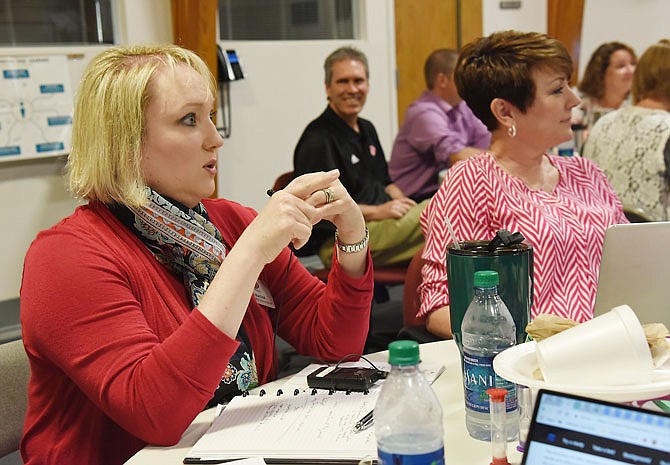Local education, juvenile justice and recreation leaders were asked Wednesday to search within themselves and examine their privileges and biases as work continues to make the community more inclusive.
Jefferson City Public Schools held the second of three scheduled training sessions led by Juanita Simmons, who is vice president of diversity, equity and inclusion at Northwest Missouri State University in Maryville and a former public school teacher and administrator.
Jefferson City Parks, Recreation and Forestry Department and Cole County Juvenile Court staff joined JCPS staff, building administrators, and current and former school board members to continue discussions intended to "start an ongoing conversation and training that enables the district and its student/family-centered service providers to move toward a cultural-sensitivity, inclusive and caring unit," according to the objective stated in Simmons' presentation.
A more specific ultimate goal of the training - and what will be the main topic at the third session with Simmons in August - is to enable the district and the local juvenile court to examine how policies and practices may lead to a confirmed disproportionate disciplining of black students and juvenile court referral rate.
To get there, Simmons has had the group of local institutional leaders study privilege, how privilege can create biases and how biases can change decision-making in discretionary situations - such as when an administrator has to decide if or how to discipline a student.
Privileges are the advantages people are born with or are able to convince people they were born with that enable them to grow, develop and live without some of the barriers faced by other people without those societal advantages - such as being male, white, heterosexual, able-bodied or of a higher economic class.
"To have privilege is to be allowed to move through your life without being marked in ways that identify you as an outsider, as exceptional or 'other' to be excluded, or to be included but always with conditions," according to assigned reading for the training.
The assigned reading noted privilege enables people with it to more likely have things go their way, be able to be taken seriously, receive attention, set agendas and control rules and standards and how they're applied.
"Its root is about control and power," Simmons explained, adding biases grew from privilege through the stratification of society's institutional power systems.
Session attendees were asked between the first and second trainings to do at least the race and one other implicit bias test available at implicit.harvard.edu/implicit/selectatest.html.
Implicit biases are the normal, unconscious, often unintentional and instantaneous assessments people make of others based on attitudes or stereotypes; the tests are meant to help takers identify their biases.
The goal of the implicit bias tests isn't to shame people for their privileges or biases but to enable people to examine whether how they use the discretionary powers they have disproportionately and negatively affects certain groups of people.
"It's (about) what you do," Simmons explained.
She affirmed most every person in education and other public service professions is the type of person who consciously wants to do good - but that also doesn't mean they're incapable of even unconsciously causing harm.
The training sessions with Simmons on diversity and civility are one of three immediate measures the school district announced earlier this year to address community concerns about equity and inclusion after an incident last fall involving some Jefferson City High School students and a racially insensitive photo spurred large-scale community discussions.
Local juvenile court administrator and former JCPS school board member Michael Couty applied for the more than $8,000 Missouri Department of Public Safety grant to pay for Simmons to come do the training sessions this year, and Couty said in January he could reapply for the grant. He and JCPS Director of Human Resources Shelby Scarbrough organized the sessions.

